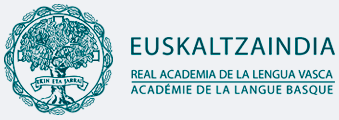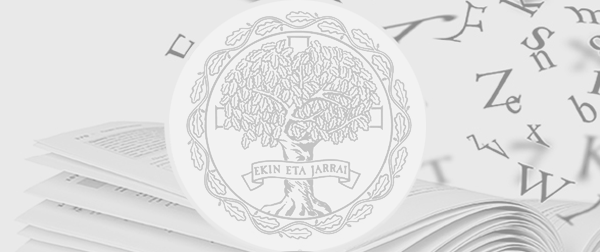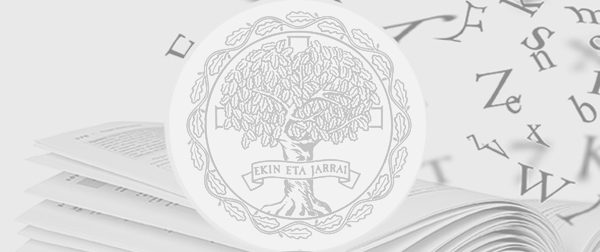-
Contents
- Home
- Last publications
- Research numbers
- Meeting minutes
- Archives
-
Send your work
- Paper submission
- Writing guidelines
- Ethical guidelines
-
Information
- Idazketa Kontseilua
- Aholku Batzordea
ISSN: 0210-1564 (Printed version)
ISSN: 2792-2278 (Electronic version)
Ethical guidelines - Euskera
ETHICAL GUIDELINES FOR PUBLISHING IN EUSKERA MAGAZINE
In a peer-reviewed magazine, publishing research articles is the basis for developing a coherent, respected knowledge network. It is a demonstration of the correct quality of the work carried out by the authors and the institutions sponsoring them. Peer-reviewed research articles are the basis and demonstration of a scientific method. It is, therefore, important for all those taking part in the process of publication to agree on norms regulating ethical behaviour; this includes the authors, the magazine editor, peer reviewers, the publisher and Euskaltzaindia.
One of the publisher's most important roles is to support the considerable work carried out by the magazine editors and peer reviewers in order to maintain academic standards. It is the publisher's responsibility to assist, guide and protect academic communication and, in fact, the publisher is responsible for ensuring that the most appropriate practices are followed.
We are committed to advertising, republication and other sources of commercial income not affecting or influencing this. Euskaltzaindia also offers assistance with communication with other magazines and/or publishers if this is helpful for the editors. Lastly, we collaborate closely with various publishers and sector associations with regards to ethical matters in order to implement appropriate norms when mistakes are made or the wrong direction is taken and, furthermore, we have have the ability to examine legal issues and give specialist advice.
AUTHORS' OBLIGATIONS
Norms for writing reports
The authors of original research papers must give exact explanations about their work as well as an objective explanation of its importance. The data on which the work is based must also be precisely stated in all research articles. Sufficient details must be provided for a third party to be able to reference the work carried out. We hold deceptive and deliberately misleading statements to be unethical and do not accept them.
Reinterpretations and professional publication research articles must be precise and objective; any works which include opinions must clearly state that they are such.
Access to data and data storage
Authors may be asked to present untreated data connected with their research articles for editorial revision, and they must also be ready for this data to be made available to the public on such occasions. Furthermore, they must be prepared to keep such data for a reasonable period after the time of publication.
Originality and plagiarism
Authors must ensure that the work they write is completely original and, if they do use third parties’ work and/or words, this must be correctly stated in the references or quotations.
There are many types of plagiarism: for instance, presenting another person’s research article as if it were one’s own; copying or paraphrasing large parts of another person’s work (without quoting the original author’s influence); presenting the results obtained in other research work as one’s own. Plagiarism,in all its variants, is unethical in publications and is not accepted.
Multiple, duplicated or repeated publications
Authors, in general, should not send previously published research articles to other magazines for publication. The publication of some types of research articles (translations, for instance) is justified as long as certain conditions are complied with. Magazine authors and editors must reach an agreement about second publications (when appropriate). The initial publication's references, data and interpretation must be maintained any subsequent publication.
Recognising sources
Others' work must always be properly recognised. Authors must quote publications which have had a direct impact on the nature of their work. Information obtained by private means (such as in interviews, by correspondence or in discussion with third parties) must not be used or mentioned if there is no written permission to do so from the source of such data. Information obtained by confidential services (such as in work to judge manuscripts or to obtain grants) must not be used unless there is written permission from the person or persons in charge of such work.
Research article authorship
The author must ensure that all the contributors to the research article who should be are included in the research article. In addition to that, the author must make sure that all the co-authors see and approve the last version of the research article and agree to its publication.
Distribution and conflicts of interests
All authors must state in their manuscripts the financial support they have received and any other major conflicts of interest which might affect the manuscript's results and/or interpretation. All the sources of finance which the project has received must be stated.
Important mistakes in published work
When an author finds a major mistake or error in published work, it is the author's duty to immediately inform the editor or publisher and work with the editor to stop the research article from being further distributed or to correct it. If the editor or publisher is informed by a third party that there is a major mistake in a published work, the author has an immediate obligation to examine the research article and correct it or to prove to the editor that there is, in fact, no such mistake.
EDITORS' OBLIGATIONS
Publishing decisions
This magazine’s Editorial Committee, which is assessed by experts, is responsible for deciding which of the research articles received are to be published and often works together with the corresponding association (in magazines which are owned or sponsored by the association). The criteria followed to take these decisions is always the value of each work for researchers and its importance for readers. The Editorial Committee will at all times take into account legal considerations in connection with libel, breach of copyright and plagiarism. The Editorial Committee may consult with other evaluators (or people in charge at associations) in order to take its decisions.
Fair play
When the Editorial Committee examines manuscripts, it takes their intellectual content into account regardless of the authors' race, gender, sexual orientation, religious beliefs, ethnic origin, nationality or political views.
Confidentiality
The technical secretary and the members of the Editorial Committee will not give information about the manuscript to anybody other than the author, the evaluator, candidates to be evaluators, other publishing advisors and the publisher.
Distribution and conflicts of interests
- Unpublished material received in the manuscripts submitted may not be used by members of the Editorial Committee for their own research work unless they obtain the author's written consent.
- Inside information and ideas received from evaluators must be treated as confidential and may not be used for personal advantage.
- Members of the Editorial Committee must renounce the examination of manuscripts when there is a conflict of interest (they will have to ask a co-editor or another member of the Editorial Committee to carry out the examination and take the corresponding decision); in other words, they must not examine the manuscript if they compete with or work with institutions which may be connected with the authors, companies or research papers.
- The members of the Editorial Committee must ask all collaborators to state their conflicts of interest and corrections must be made if, after publication, it is found that there are any such conflicts of interest. If necessary, other actions may also be taken, such as publishing an explanatory note or a statement of irregularity.
- In sponsored supplements, it must be ensured that the experts' process of evaluation is the same as that used in the main magazine itself. Sponsored pieces in supplements must only be accepted taking academic value and readers' interests into account, and not commercial interests.
- The experts must clearly state which sections have not be evaluated.
Participation and collaboration in research work
The members of the Editorial Committee, in collaboration with Euskaltzaindia, must take effective measures when complaints are received about the ethics ofa manuscript or a published research article. Those measures will normally include getting in touch with the author of the manuscript or research article and dealing with the claim or complaint, and giving further information to the institution and research body in question. If the claim is ratified, a correction, withdrawal from circulation, statement of irregularity or some other type of note will have to be issued as appropriate. All and any unethical behaviour in publications which is reported must be examined in depth, along with related work published during previous years.
EVALUATORS' OBLIGATIONS
Contributions to publishing decisions
Experts' evaluations are used to help the Editorial Committee to take its decision, and, once communication about the publication has begun with the author, the latter is also given help with making improvements to the research article in question. The experts' evaluation is a fundamental component of formal academic communication: it is the main body of the scientific method used. In Euskaltzaindia’s opinion, which is also that of many others, all the experts who want to take part in publications have the duty to contribute their expert knowledge to the relevant extent.
Timeliness
If a person chosen to take part in the selection process does not believe him/herself able to evaluate a research manuscript, or if he/she knows that he/she will not be able to complete the evaluation on time, he/she must inform the technical secretary and be removed from the evaluation process.
Confidentiality
Manuscripts evaluated must be treated with confidentiality. Nobody may besh own the manuscript, nor may it be discussed with anybody unless the Editorial Committee gives its permission.
Objectivity norms
Evaluations must be made objectively. It is not appropriate to criticize authors personally. Those evaluating must explain their point of view clearly and back it up with arguments.
Recognising sources
The evaluators must identify any published works which the authors have not mentioned. Along with a note, conclusion or reasoning stating the above, the appropriate quotations must be stated. An evaluator must inform the technical secretary if he/she finds considerable similarity between the manuscript under examination and any other published research article.
Distribution and conflicts of interests
Unpublished material received in the manuscripts submitted may not be used by evaluators for their own research work unless they obtain the author's written consent. Inside information and ideas received from evaluators must be treated as confidential and may not be used for personal advantage. Evaluators do not have to examine manuscripts which give rise to any conflict of interests, in other words, they must not examine the manuscript if they compete with or work with institutions which may be connected with the authors, companies or research papers.



